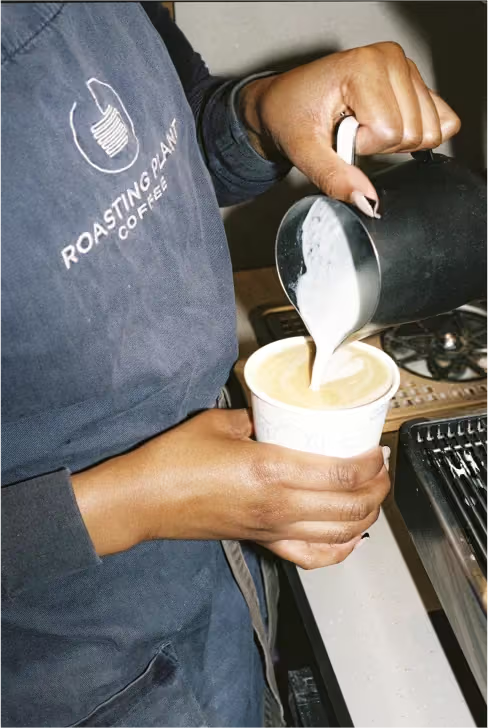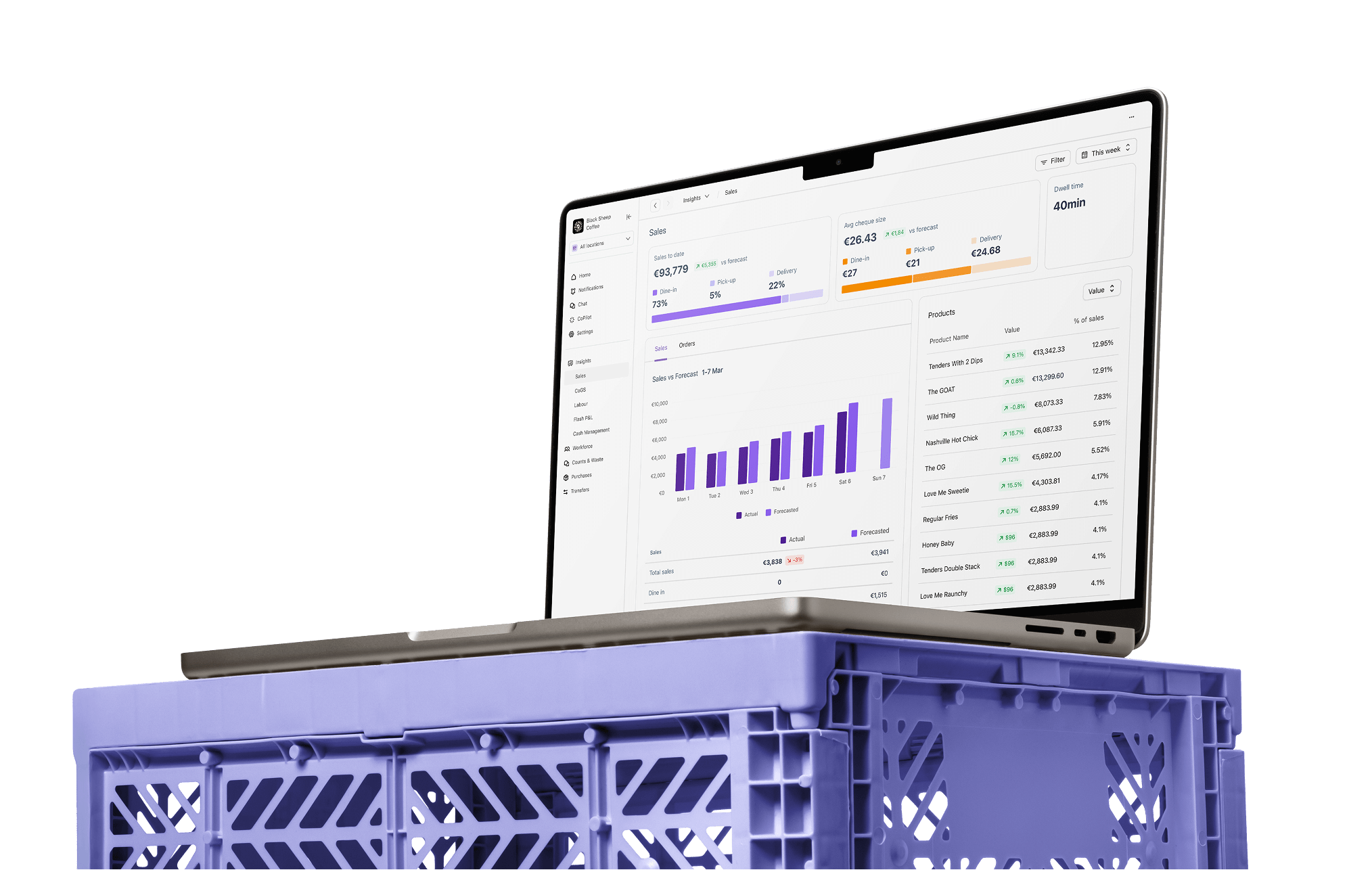Using technology to build an epic playbook to franchise a restaurant
You’ve found the right franchise partner, and you’re ready to take the plunge and expand your business. Congrats!
But for franchisees to succeed, they need quite a bit of support. This means being on hand to help with branding, recipes, understanding the business model, supplier relationships, equipment — the list goes on.
When you’re running a business, you don’t always have the time to support new franchisees every step of the way.
The solution?
Use technology to franchise your restaurant!
Technology allows you to support franchisees without needing to and make the process easier for them to manage. It can deliver training, handle marketing activity, and even help with operations management to get the venue up and running.
If you’re not sure where to start with franchising technology, don’t worry. By the end of this article, you’ll know how to use technology to create an effective franchising playbook for your restaurant.
1. Use digital tools for training
One of the most effective things that technology can do is deliver digital training to your franchisees.
It means that franchisees can complete the courses on their own time, and you don’t have to individually deliver training to each location. You can share the playbook with the training modules and let franchisees do the training themselves.
It’s a simple but efficient way to cover important aspects of franchising, such as:
- Operating procedures
- The systems and technology you use
- How to represent your brand
- The items on your food menu
- Quality control
As part of your playbook, you can develop interactive and engaging online training modules for franchisees in all of these areas. Learning management systems (LMS), like Litmos or TalentLMS, help you organise, deliver, and track training programs.
2. Provide operational support
We probably don’t have to tell you that managing restaurant operations is no easy feat, even for an experienced restaurant owner. For a new franchisee, wrapping their heads around the logistics of running a restaurant can be pretty overwhelming.
With the right technology, you can take a weight off their shoulders and support franchisees with their operations.
Take a look at Nory, as an example. With our restaurant management software, franchisees can handle all operations in a central location. This includes:
- Organising inventory management
- Overseeing supply chains
- Managing the workforce, including scheduling and payroll
- Paying your employees with Nory Pay
Jacob Long, co-owner of Grioladhh, talks about the impact of using Nory through the franchising process:
“We would go through recipes, costs, labour, technology — everything. After opening, we still provide ongoing support and training. We’ll be there for however long it takes to get people up and running, and Nory makes this easier for us to manage.”
Adding this technology to your playbook is not just about making current operations smoother; it’s about laying a solid foundation for when you decide to franchise a restaurant. This approach ensures that franchisees have a robust operational framework to rely on from day one. They can hit the ground running without the steep learning curve often associated with figuring out the logistics of restaurant operations.
3. Ensure solid data protection
Franchise businesses often operate as semi-independent entities within a larger brand. This operational model can vary. Some franchisees function like subsidiaries with minimal private data separation, while others have total operational independence.
But despite these variations, there’s a common theme with how each party of the franchisor-franchisee relationship handles data:
Franchisers tend to manage workforce and inventory data, while franchisees handle their specific locations.
This means you need solid data protection measures in place to ensure each location is secure from breaches and stores data safely. The good news is that with the right technology, you can achieve this.
With Nory, for example, you can onboard new franchisees while protecting data. You can add permissions in the system, restricting access to confidential data and features. Plus, you can view performance reports and operational data while ensuring robust data security and privacy.
4. Implement marketing strategies
Running a smooth operation is only one part of the puzzle for a successful restaurant. You also need diners coming through the door to help the franchise thrive.
And what better way to get the word out there than by marketing the restaurant to the right people?
Digital marketing technology should be a key player in your franchise playbook. It can help you support your franchisees during the early stages of their operation, getting the word out there to promote the new location and attract the right audience.
Personalisation is the key tactic to consider when using marketing technology. 95% of marketers rated their personalisation strategies as somewhat or very successful
So how can you personalise marketing for your franchises?
There are a few ways:
- Personalise ads. If you’re using search engine or social media ads to promote your restaurant, try to personalise them as much as possible. Use names, locations, demographics, and browsing history to create ads that resonate with the audience you want to target. You can use software like HubSpot to manage and personalise ads.
- Offer tailored discounts. Give customers tailored discounts to grab their attention and encourage them to visit the restaurant. With loyalty programs, for example, you can offer personalised and timely discounts based on customer behaviour. After so many meals, you might offer them their favourite side for free. How do you know it’s their favourite? Because you’ve got the stats to prove it.
- Use omnichannel marketing. Create a seamless customer experience by engaging with potential customers across different channels. This helps you maximise outreach and fosters a strong connection with potential diners across different touchpoints. A platform like ActiveCampaign can help you manage omnichannel marketing.
5. Track the performance of their franchise
Tracking and monitoring performance is essential for franchisees and franchisors. You both need to know how the restaurant is performing, whether the profits are looking healthy, and what you can do to improve gross profits and reduce costs.
This is why performance management software needs to be in your franchise playbook. It allows you to keep tabs on sales, and ensures that franchisees have visibility over their performance.
Without being too biassed, Nory is a great tool for managing performance. We provide real-time access to sales data on desktops and mobile, making it quick and easy for restaurant managers to see the most up-to-date information. You can even break down performance hour-by-hour to see exactly how things unfold each day.
Adam Jefferies, Head of Operations at Clean Kitchen, has been using Nory ahead of a big franchising operation. Here’s why he said it’s so useful for their business:
“With Nory, everyone’s using the same real-time data, allowing us all to track stock, sales, performance, labour productivity, and more. As we start to scale, these features will be invaluable to our success.”

And if you’re managing multiple franchises, a platform like Nory allows you to compare everything in a central location. You can see if certain locations are underperforming, figure out whether it’s an isolated incident, and help franchisees overcome hurdles to succeed.
Support franchisees with the right technology
Helping franchisees can be time-consuming, but it’s essential to ensure success. With technology, you can relieve some pressure from yourself and ensure your franchisees are equipped and trained to represent your brand and thrive in the hospitality industry.
Use technology to empower franchisees to succeed
From training and operational support, to marketing and performance management—technology can co-pilot franchises to succeed.

FAQs - How to franchise a restaurant using technology
What is the difference between a franchise and a restaurant?
A restaurant is a single establishment owned and operated by an individual or company. A franchise is part of a larger chain, where independent owners (franchisees) operate their own locations under the established brand, following the franchisor’s guidelines and systems.
Think of it like this: an independent burger place is a restaurant, the local McDonalds is a franchise.
How do I make my restaurant a franchise?
It begins with identifying if you’re in a good financial position to franchise. If you are, you can start putting things in place to grow your business, like:
- Developing a scalable business model
- Creating solid brand guidelines for future franchisees
- Making a comprehensive franchise disclosure document (FDD)
- Establishing standardised operating procedures
- Recruiting franchisees
Can franchise owners change the menu?
It’s up to you. Most franchises have strict guidelines on decor, branding, and menus to ensure quality consistency across locations.
However, you might want to provide some creative freedom to franchisees to interpret your cuisine in their own way. This could help different franchises appeal to regional likes and tastes, which could help your business succeed.
Side note: If you decide to do this, you’ll need to be extra vigilant around service and quality control. When things aren’t standardised, it’s hard to track quality.


.webp)
.webp)


